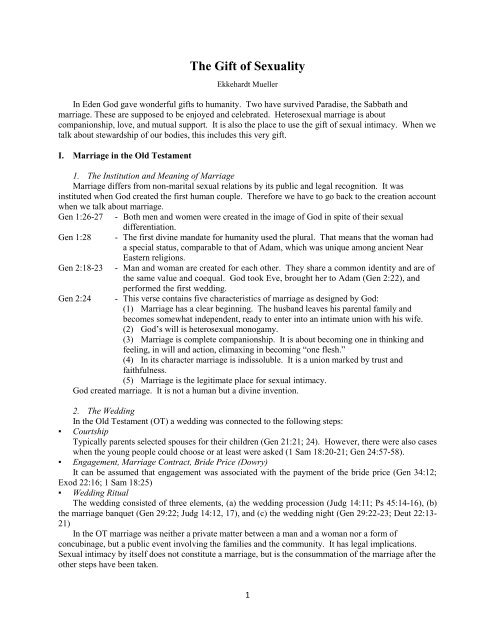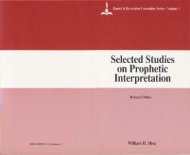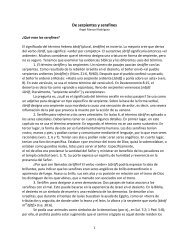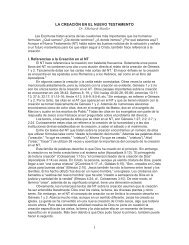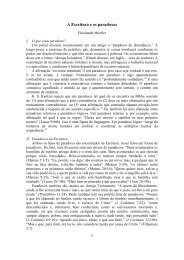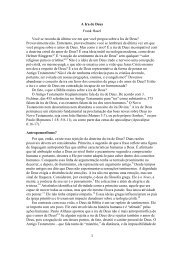Read Document - Biblical Research Institute
Read Document - Biblical Research Institute
Read Document - Biblical Research Institute
Create successful ePaper yourself
Turn your PDF publications into a flip-book with our unique Google optimized e-Paper software.
The Gift of Sexuality<br />
Ekkehardt Mueller<br />
In Eden God gave wonderful gifts to humanity. Two have survived Paradise, the Sabbath and<br />
marriage. These are supposed to be enjoyed and celebrated. Heterosexual marriage is about<br />
companionship, love, and mutual support. It is also the place to use the gift of sexual intimacy. When we<br />
talk about stewardship of our bodies, this includes this very gift.<br />
I. Marriage in the Old Testament<br />
1. The Institution and Meaning of Marriage<br />
Marriage differs from non-marital sexual relations by its public and legal recognition. It was<br />
instituted when God created the first human couple. Therefore we have to go back to the creation account<br />
when we talk about marriage.<br />
Gen 1:26-27 - Both men and women were created in the image of God in spite of their sexual<br />
differentiation.<br />
Gen 1:28 - The first divine mandate for humanity used the plural. That means that the woman had<br />
a special status, comparable to that of Adam, which was unique among ancient Near<br />
Eastern religions.<br />
Gen 2:18-23 - Man and woman are created for each other. They share a common identity and are of<br />
the same value and coequal. God took Eve, brought her to Adam (Gen 2:22), and<br />
performed the first wedding.<br />
Gen 2:24 - This verse contains five characteristics of marriage as designed by God:<br />
(1) Marriage has a clear beginning. The husband leaves his parental family and<br />
becomes somewhat independent, ready to enter into an intimate union with his wife.<br />
(2) God’s will is heterosexual monogamy.<br />
(3) Marriage is complete companionship. It is about becoming one in thinking and<br />
feeling, in will and action, climaxing in becoming “one flesh.”<br />
(4) In its character marriage is indissoluble. It is a union marked by trust and<br />
faithfulness.<br />
(5) Marriage is the legitimate place for sexual intimacy.<br />
God created marriage. It is not a human but a divine invention.<br />
2. The Wedding<br />
In the Old Testament (OT) a wedding was connected to the following steps:<br />
▪ Courtship<br />
Typically parents selected spouses for their children (Gen 21:21; 24). However, there were also cases<br />
when the young people could choose or at least were asked (1 Sam 18:20-21; Gen 24:57-58).<br />
▪ Engagement, Marriage Contract, Bride Price (Dowry)<br />
It can be assumed that engagement was associated with the payment of the bride price (Gen 34:12;<br />
Exod 22:16; 1 Sam 18:25)<br />
▪ Wedding Ritual<br />
The wedding consisted of three elements, (a) the wedding procession (Judg 14:11; Ps 45:14-16), (b)<br />
the marriage banquet (Gen 29:22; Judg 14:12, 17), and (c) the wedding night (Gen 29:22-23; Deut 22:13-<br />
21)<br />
In the OT marriage was neither a private matter between a man and a woman nor a form of<br />
concubinage, but a public event involving the families and the community. It has legal implications.<br />
Sexual intimacy by itself does not constitute a marriage, but is the consummation of the marriage after the<br />
other steps have been taken.<br />
1
II. Marriage in the New Testament<br />
With regard to marriage, the New Testament (NT) follows the OT and does not develop a new form<br />
of marriage. This is not an exception because other OT teachings and institutions are also presupposed<br />
and continued in the NT, such as creation, the Decalogue, and the Sabbath.<br />
Jesus - He participated in a wedding (John 2) and referred to marriage in various places,<br />
dealing with marriage (references to the creation account; various parables, e. g. , Matt<br />
22:1-14; 25:1-13), adultery, and divorce (Matt 5:27-32; 19:1-10). He also made<br />
provisions for remaining single (Matt 19:12).<br />
Paul - He dealt with marriage and related aspects in various places (e. g. , 1 Cor 7). In Eph<br />
5:22-33 he compared marriage of a man and a woman with the relationship between<br />
Jesus and his church. This appreciation of marriage has deeply influenced Christianity.<br />
Matt 1:18-20 - Maria and Joseph are engaged but not yet involved in sexual intimacy.<br />
Matt 19:5 - Jesus refers back to Gen 2:24 and stresses the permanence of marriage.<br />
John 8:41 - The Jews suggested that Jesus was an illegitimate child, looking down upon him.<br />
1 Cor 7:8-9 - A legitimate alternative to getting married is not to cohabit but to “burn” (with passion).<br />
According to the NT, marriage was instituted by God at creation. The NT maintains the marriage<br />
constituting elements of the OT. Again, marriage is not just a private matter but has a public and legal<br />
character. Premarital virginity is stressed. In both Testaments marriage is protected by God in a special<br />
way (Mal 2:14-16; Matt 19:4-6). Therefore, Christians commit themselves to their spouses publicly,<br />
exclusively, and permanently, seeking God’s blessing in the community of believers.<br />
III. Sexuality Gone Wrong<br />
1 Cor 6:9-11 - This passage and its context answer the following questions:<br />
1. Why Should Christians Avoid Sexual Sins<br />
▪ Because there is a kingdom to gain. A misuse of the gift of sexuality does not square with God’s rule<br />
and his kingdom (1 Cor 6:9-10).<br />
▪ Immorality is damaging. It harms or destroys relationships with spouse, family, friends, and<br />
neighbors (1 Cor 7:10-14). It harms the relationship with God (1 Cor 6:15; 7:35). And it harms<br />
ourselves—emotionally, psychologically, and physically (1 Cor 6:18). God wants us to live fulfilled lives<br />
(John 10:10).<br />
2. What Are Sexual Sins<br />
▪ Fornication: Fornication is a broad concept in Scripture and typically includes all sins of a sexual<br />
nature such as premarital sex, adultery, incest, homosexuality, sodomy, and others. However, if it is<br />
listed with some or all of these other sins, it may describe premarital sexual intimacy (see Heb 13:4).<br />
▪ Adultery: Adultery describes a sexual affair with a person other than one’s spouse (John 8:3-11; 1 Cor<br />
6:15-20).<br />
▪ Homosexual Activity: In 1 Cor 6:9 the effeminate seems to play the female in a homoerotic<br />
relationship, while the second Greek term, asernokoitēs, the male who lies with a male, obviously<br />
describes the one playing the male in such a relationship. See also Lev 18:22; Rom 1:26-27.<br />
▪ Incest: Incest describes a sexual relationship with a close relative (1 Cor 5:1-2; Lev 18:6-18).<br />
▪ Divorce: Following Jesus who had addressed the matter of divorce (Matt 19:1-10; Mark 10:1-10),<br />
Paul is also opposed to divorce (1 Cor 7:10-16). See also Mal 2:16.<br />
▪ Intentional Mixed Marriages: A widow and—by implication a widower—may remarry, but it<br />
should be “only in the Lord” (1 Cor 7:39). In the context of 1Cor 5-7 this has been understood as a<br />
warning against a marriage with an unbeliever whatever philosophy of life this person would adhere to<br />
other than true biblical faith. See also Deut 7:3; Neh 13:23-25.<br />
2
3. Why is there still hope for sinners<br />
The last part of our passage is full of hope: “Such were some of you; but you were washed, but you<br />
were sanctified, but you were justified in the name of the Lord Jesus Christ and in the Spirit of our God”<br />
(1 Cor 6:11). If we have failed and sinned, forgiveness and a new beginning are possible through God’s<br />
grace. Yet Jesus challenges us also: “Go and sin no more” (John 8:11).<br />
Conclusion<br />
God has given humanity the gift of marriage including sexual intimacy. This gift of true love needs<br />
to be treasured, kept pure, and protected against abuse. It is a symbol of our relationship with the Lord.<br />
7/12<br />
Copyright © <strong>Biblical</strong> <strong>Research</strong> <strong>Institute</strong> General Conference of Seventh-day Adventists®<br />
3


